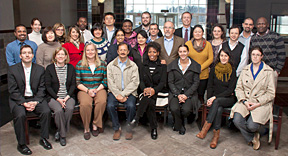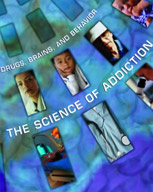Earlier this month, the NIDA International Program welcomed 27 fellows from as many nations as part of an orientation for new fellowship awardees. International Program Director Steven W. Gust, Ph.D., and Associate Director Dale Weiss hosted the Hubert H. Humphrey Fellows from Virginia Commonwealth University and Johns Hopkins University, who were joined by NIDA INVEST and INVEST/CTN fellows for the 3-day orientation. Fellows learned about the Institute's international research priorities as well as NIDA and National Institutes of Health resources and collaboration and training tools that the fellows can access during their time in the United States and after they return to their home countries to continue their research.

NIDA International Program's Ms. Dale Weiss, Associate Director, sitting second from left, welcomes new 2012 Hubert H. Humphrey, INVEST, and INVEST-CTN Fellows.
During the orientation, fellows traveled to nearby College Park, Maryland, to network with researchers and students there who are part of the University of Maryland’s Center for Addictions Personality and Emotion Research (CAPER). CAPER students and researchers gave talks on such topics as self-regulatory mechanisms in risk taking, meditative therapies for managing addiction, and behavioral activation treatment. Four NIDA fellows described the state of drug abuse in their countries and the research they are currently undertaking. The fellows’ presentations elucidated questions from the audience members who were interested to hear about the extent of drug abuse in these countries and the differences in how prevention and treatment programs are implemented, given the different cultural and geographic challenges in the regions. Highlights of the NIDA fellow presentations are below:
- Maria de L. Garcia-Anaya, M.D., Ph.D., National Institute of Psychiatry, Ramón de la Fuente Muñiz, spoke about the ongoing work to develop a Clinical Trials Network (CTN) in Mexico. The effort, part of a collaboration between the U.S. State Department and Mexico, is supported by the NIDA Center for the CTN, the NIDA International Program, and the Florida Node Alliance at the University of Miami. During her fellowship, Dr. Garcia-Anaya is splitting her time between two clinical trial nodes, the Greater New York Regional Node and the Florida Alliance Node, to enhance her clinical research skills for her return to Mexico. Her current project deals with a therapeutic model for substance abuse disorders comorbid with depression.
- Saeed Momtazi, M.D., an addiction psychiatrist in Iran, offered an historical perspective on the drugs of abuse in the country and described some of the current problems resulting from opium use. Geography, Dr. Momtazi explained, is one of the main reasons the prevalence of opium drug abuse is so high in Iran. Afghanistan, which borders Iran in the east, produces 90 percent of the world’s supply of opium and transports much of it through Iran to other countries, increasing access to the drug by Iranians. In addition, there is no social stigma attached to opium use in the country, making harm reduction programs almost ineffective. Current efforts seek to create a change in perceptions of harm over time. Dr. Momtazi plans to use his time with mentor Richard A. Rawson, Ph.D., Integrated Substance Abuse Programs, University of California, Los Angeles, to gain experience in questionnaire construction, sampling strategies, and data analysis.
- One of only 12 psychiatrists in his country, Eugene Dordoye, MBChB, MGCPsych, Ghana, spoke of the easy access to alcohol, marijuana, tobacco, cocaine, heroin, and other drugs for Ghanaians. The country is a major hub of drug trafficking, which makes it easier to access illicit drugs. Additionally, many Ghanaians promote the cultural myth that marijuana is the “weed of wisdom.” Treatment options are lacking. Twelve-step programs are rudimentary, and national policies on alcohol and drug abuse are in the draft stages. Dr. Dordoye plans to use his Hubert H. Humphrey Fellowship to obtain knowledge and skills needed to construct a baseline survey to determine the extent of drug abuse in the country and to explore the value of the extended family system for recovery.
- Tin Moe Aung, MBBS, Burma (Myanmar), a Hubert H. Humphrey Fellow, spoke of the state of tobacco and drug use in a nation of more than 54.5 million people. Substance use takes many forms in the region. Chewing betel quid (a leafy vine that has a mild stimulant effect) and smoking watery tobacco, hand-rolled cheroots cigars, and cigarettes are common. Heroin is the more common nontobacco drug of abuse, with amphetamines, marijuana, dextromethorphan, and glue inhalants following. A 2010 national report found that more than 300,000 people were dealing with some type of addiction; however, Dr. Aung noted that number is likely quite small given the prevalence of HIV among the population. She went on to explain the difficulties in collecting data, largely due to the many remote areas of Burma (Myanmar) and the communication, transportation, and social barriers seen in the region. The existing measures—drug demand reduction, drop-in centers, harm reduction programs, and rehabilitation centers—do not do enough to combat these challenges.
During the orientation, the fellows also heard from representatives of the NIDA divisions about their offices’ international research priorities and opportunities for collaborative international research. Shana Potash, National Library of Medicine, briefed the fellows on online resources available to international users, and James Herrington, Ph.D., M.P.H., director of the Fogarty International Center, discussed the center’s research training and funding programs.




.png)


